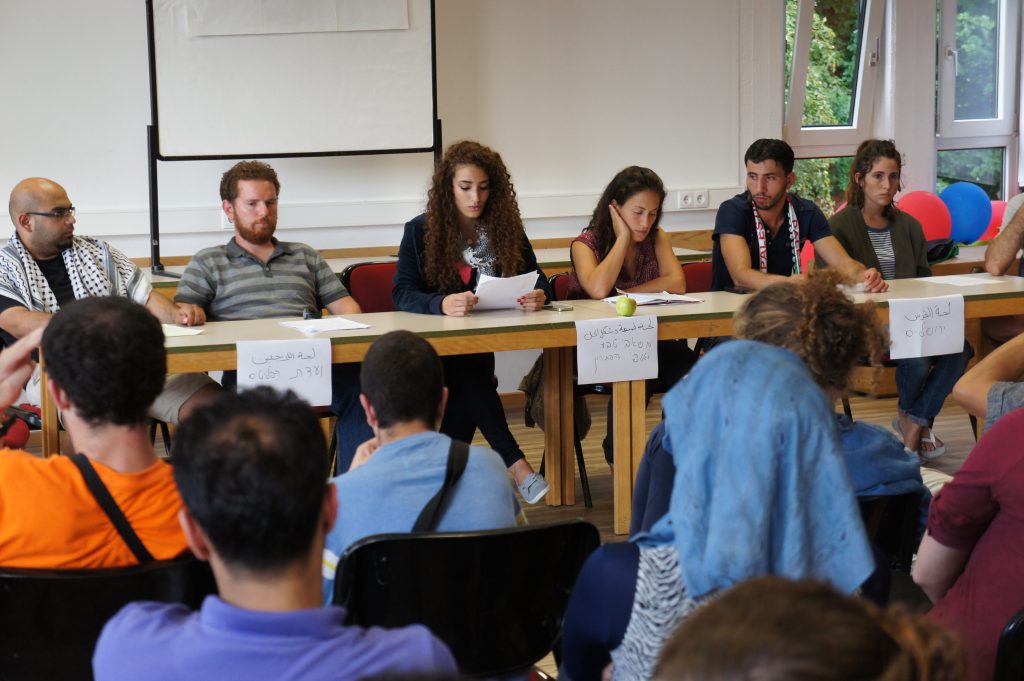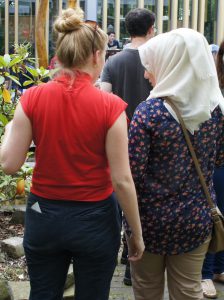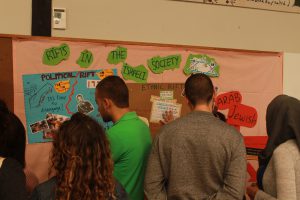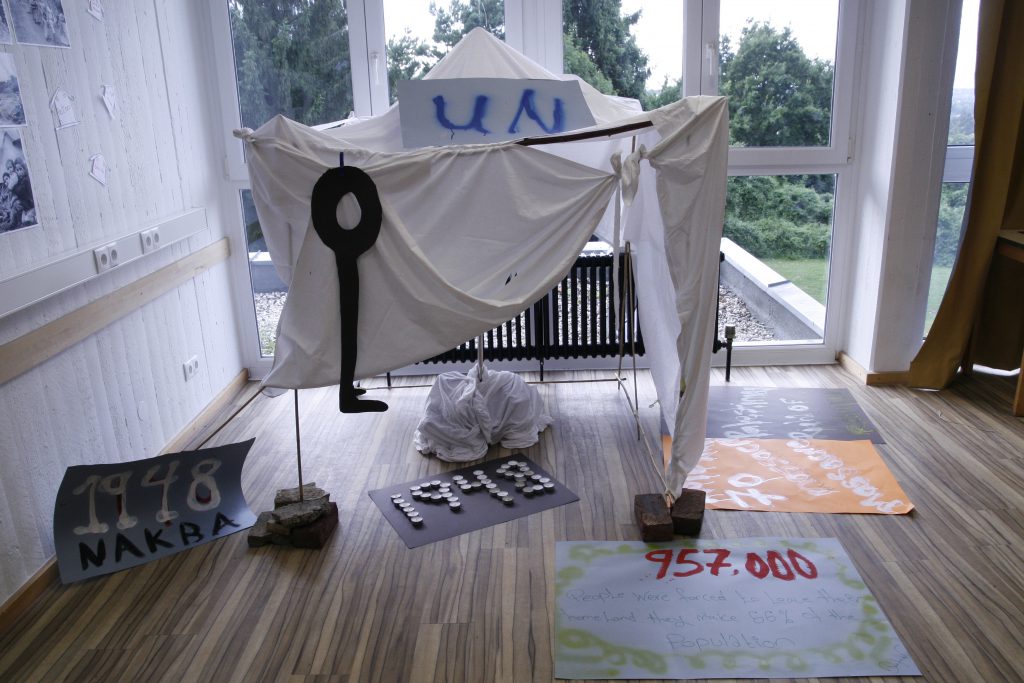Yearly Dialogue Seminars for young adults from Israel and Palestine
Speak up invites young adults from Israel and the Palestinian Westbank to Germany for two-week dialogue seminars every summer. There, they not only live under one roof, but work in dialogue groups on the history of conflict and the current situation in Israel and Palestine.
The participants

The group of participants is composed of Palestinians from the West Bank and East Jerusalem as well as Jewish Israelis and some Palestinians with Israeli citizenship. Religious affiliation plays no role in the selection of the participants, the proportion of Christian Palestinians usually corresponds approximately to that in the Palestinian population. The participants come from different cities and from different societal backgrounds and social classes.
The seminars deliberately addresses young adults who have not previously participated in similar seminars. On average, they are between 20 and 30 years old. One seminar is open to all genders, here we make sure that the share of women* and men* is as equal as possible. The second annual seminar is for women* only.
Our local partners promote the seminars online or in the form of posters (to the extent the political context allows them to do so without experiencing repression) and put the groups together after a personal conversation. Four to five preparatory meetings take place before the seminar in Germany – for the Israelis mostly in Tel Aviv and for the Palestinians mostly in Ramallah. In addition to information about the trip and the organizational process, the participants are also informed about contents of the seminars, encouraged to familiarize themselves with the topics in advance and talk about fears and expectations.
The Seminars‘ Process

The Dialogue Seminars take place near Cologne. While the participants from Israel can fly directly to Germany via the airport in Tel Aviv, the young men and women from the Palestinian West Bank have to cross the border to Jordan, which is often associated with long waiting times. Depending on the time of departure at Amman airport, an overnight stay is necessary there, which makes the journey time-consuming and costly.
Both groups meet for the first time near Cologne. There, they spend two weeks together under one roof, organizing everyday life together, using meals for personal talks or fierce discussions. In their free time, they experience themselves as people of the same age, often with similar interests; they share the same joie de vivre and the desire for a life in safety.
On the first day, the participants are divided into three dialogue groups, each with the same number of Palestinians and Israelis. Intensive discussions within these groups are the core of the seminars. Each group is led by two facilitators, one from Israel and one from Palestine, and a translator for Arabic and Hebrew, which allows participants to speak in their native language thus preventing knowledge of English from being required.
Thematic work
On the first day, groups usually start with „warming-up“ activities, where they get to know each other playfully, but also question their own expectations, fears and prejudices. They write e.g. their expectations on paper and put them into envelopes to open them at the end of the seminar: Have positive or negative expectations come true?
When participants first meet, they often confront each other with blame: who is more victim, who is more perpetrator? Who has more guilt? Who is the moral winner of this conflict?
In the dialogue groups, the participants first tell their own, personal „narrative“, their own story. How do they live? How does the conflict affect their life and their daily routine? Getting to know each other on a personal level makes it possible to develop empathy for each other and to get to know the conflict through the descriptions of others.

The stories of their families often tell of flight and expulsion. They show, in a very personal way, how differently the common history is perceived: The founding of the state of Israel, celebrated by Israelis as the end of the diaspora and the beginning of self-determination and security of their own existence, for the other side is the “Nakba”, a disaster, associated with expulsion and suffering.

Fateful Year 1948 is part of the collective narrative of both sides, the collective memory of their societies and the interpretation of history, influenced by collective myths, traumas and experiences. The Israeli and Palestinian groups each present their collective narrative in elaborate presentations, the preparation of which leads to long and controversial discussions in both groups: which historical events are important and should be shown? Which influence your reality today? What defines your society today? Each group also invites the others to a „cultural evening“, shows dances, represents in small skits their own society and – what would be culture without food – cooks for their guests.
At the end of the seminars, the participants reglulary deal specifically with the question what a solution might look like and what they can contribute to it. For some years this has been discussed for the most part under the keyword „Transitional Justice“: What could a process towards a just solution look like? Who would have to be held accountable for harm done and in what way? Here, the participants notice how difficult it is for them to make concessions and how much their own fears prevents them from doing so.
An exemplary report (in German) about the work in a dialogue group in summer 2015 can be found here.
Joint leisure

In addition to the intensive dialogue process, the participants also share some experiences: for example, they discover Cologne at a city rally or enjoy the Rhine on a boat trip to Bonn. Most impressive, however, is for most participants the crossing of an inner European border on the way to Brussels or Maastricht: there are no security checkpoints and no turnpikes. The question how this can be possible today after two wars and the Holocaust in Europe often is a topic raised by the participants in the dialogue groups in the following days.
Many participants experience shared leisure time as ambivalent, and many Palestinians in particular are afraid of a premature „fraternization“. They feel that rapprochement and normalization of personal relationships are only possible if they give up their demands for justice for the Palestinian people. Dancing, celebrating, or doing sports together is regarded by many Palestinians as normalization, i.e. the legitimization of the status quo, and is therefore a no-go for most. For the Israelis, this alleged “refusal” attitude of the Palestinians is often difficult to understand, and many are disappointed, as they hope for friendships with Palestinians apart from the political debate during the seminars.

Although joint ventures remain the exception, this does not mean that the interaction between the two groups is limited to the official part of the dialogue program. Many of the discussions in the dialogue groups continue in the breaks, at dinner or in the evening in mixed groups or in pairs; and it is often these personal conversations and encounters that stay with the participants and make their own truth falter.
You can find reports from participants and staff here.
